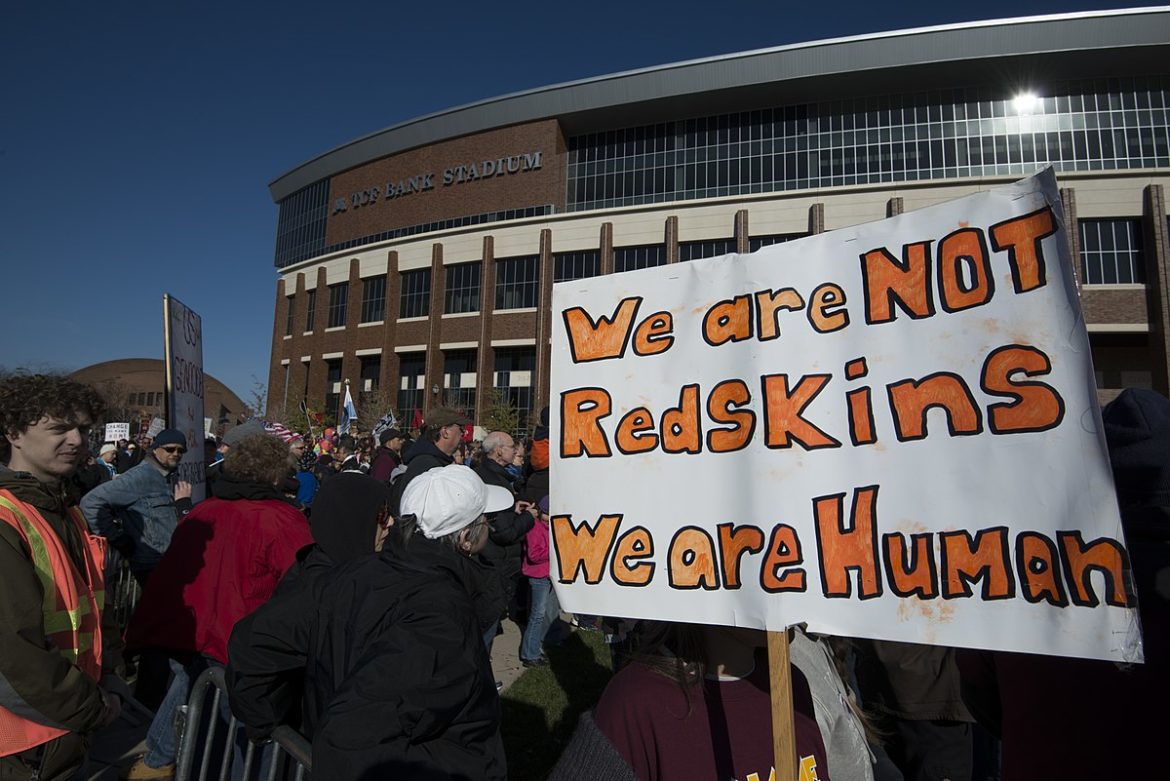Across the U.S., the number of teams named the “Chiefs,” “Savages,” “Indians,” and “Braves” has declined dramatically, but America has yet to truly reckon with its oppression of the continent’s indigenous tribes.
Published in the 2016 edition of New Internationalist.
The time may soon be coming when Americans are finally ready to stop “playing Indian.”
But it hasn’t come easy.
In the past year, efforts pressuring the Washington Redskins professional football franchise to change its name have made significant headway, with Native Americans rallying under the slogan #NotYourMascot.
In 2014, fifty U.S. Senators signed a letter to the National Football League commissioner arguing that the sport can no longer “perpetuate the use of this name as anything but what it is: a racial slur.”
The U.S. Patent and Trademark Office agreed. Last summer, it moved to cancel the Redskins’ trademark registrations, endangering millions of dollars in merchandizing revenue. The team’s appeal to this decision is pending, with a high court set to rule this summer.
Regardless of the outcome, the case has drawn renewed public attention to the issue. California is now considering a ban on using “Redskins” as a team name by public schools in the state, and the Associated Press may list it as an offensive slur in its stylebook for journalists.
Defenders of the Washington team name insist that “redskins” is a term of “honor and respect.” Yet organizations such as the National Congress of American Indians have begged to differ, passing resolutions calling for change.
“The argument has always been the same,” leading activist Suzan Shown Harjo explained to the Washington Post.
“‘We are honoring you,’ they say.”
“‘No, you’re not,’ we reply.”
“‘Shut up,’ they say.”
Let’s give the defenders of the “Redskins” franchise the benefit of the doubt. The great majority of them likely have no racist intent. They are loyal fans who have positive associations with their team’s name and are reluctant to give up a deep-rooted tradition.
Even so, these holdouts are simply not listening to Native Americans who say that seeing people paint their faces red, put on feathered head-dresses, give impassioned “war whoops,” or demonstrate their best “tomahawk chops” are hardly behaving respectfully.
Instead, such fans are tapping into a long tradition of racial stereotyping and degradation.
Into the early 1900s, Americans were enamored with live “Wild West Shows.” Like later film and TV Westerns, these depicted indigenous people either as noble savages or vicious warriors who threatened innocent (read: White) settlers on the prairie frontier. Native Americans were treated more as museum pieces than members of living communities.
As author Carol Spindel writes, the idea that “American Indians would disappear like dinosaurs” became embedded in national mythology. In dubious homage, kids were encouraged to “play Indian,” mimicking native songs and dances.
“Thrilled by the Wild West performances,” Spindel explains, “college boys and Boy Scouts emulated the showbiz Indians when they created Indian sports mascots, many of which date from the 1920s.”
Lingering behind all this was an often-murderous racism. Examining the history of “redskins” as a racial moniker, the BBC recently quoted an 1863 advertisement from a Minnesota newspaper. “The state reward for dead Indians,” it read, “has been increased to $200 for every redskin sent to purgatory.”
Across the U.S., the number of teams named the “Chiefs,” “Savages,” “Indians,” and “Braves” has declined dramatically, but America has yet to truly reckon with its oppression of the continent’s indigenous tribes.
In 2010, Congress issued an official “apology to Native Peoples of the United States.” It acknowledged “the many instances of violence, maltreatment, and neglect inflicted on Native peoples.” Yet, as historian Jennifer Guiliano notes, the “apology” also contained an official disclaimer: “Nothing in this section authorizes or supports any legal claims against the United States,” it read.
Guiliano further notes that Native Americans continue to face alarming levels of unemployment, poverty, alcoholism, diabetes, and infant mortality.
Justice requires atonement and recompense that goes far beyond dropping racist names from sports teams. But respect for those who insist, “I am not your mascot” is a preliminary—and overdue—concession.
__________
Photo credit: Fibonacci Blue/ Wikimedia Commons.
